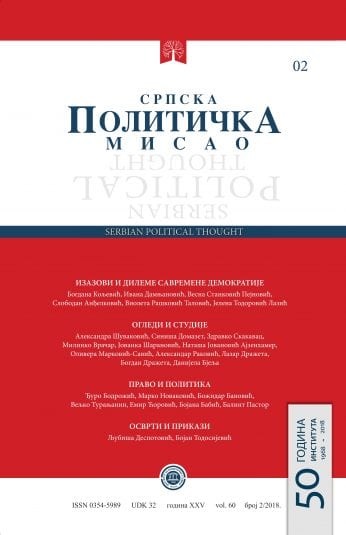Држава и неолиберални модели урушавања националних политичких институција
State and Neoliberal Models of Collapsе of National Political Institutions
Author(s): Živojin B. Đurić, Miša S. StojadinovićSubject(s): International relations/trade, Globalization
Published by: Институт за политичке студије
Keywords: nation state; multipolar world; sovereignty; political institutions; globalization; international relations; Serbia
Summary/Abstract: This paper represents a critical analysis of the importance of the national state in the contemporary society. The position of national states is often seen through the prism of neoliberalism and neorealism as the two most influential approaches in the theory of international relations. In this paper the authors use a combination of several different methods. As a basic method of their paper the authors use a geopolitical method. This method is especially important because it enables the examination of causes and consequences of the contemporary political processes in the international level. Rapid global changes have led to a substantial redistribution of the economic, political and military power, restructuring simultaneously international system and creating multipolarity. This multipolar world is not easy to understand. A nation-state during its history has drastically changed adapting to the contemporary challenges. The concept of sovereign nation-state that we know from the Westphalian Peace has been replaced recently by the idea of limited sovereignty. The process of globalization is accompanied by the increase of numerous risks and inequalities which have led to increased uncertainty in all areas of social life. This process is characterised by the strengthening of the statehood and sovereignty of the world’s leading powers. But on the other hand, smaller countries are at the same time under pressure from the leading economies. Transnational corporations which are trying to accumulate capital at all costs are mainly responsible for this. The main problem here is that weak and underdeveloped countries are not in a position to preserve their statehood under the dictation of neoliberal principles. They are compelled to adapt the entire spectre of public policies that have already been abandoned by the Western countries because they were unsuccessful. The modern state has found itself trapped within a transnational system that either collapses or at least weakens its basic functions.
Journal: Српска политичка мисао
- Issue Year: 2018
- Issue No: 4
- Page Range: 41-57
- Page Count: 17
- Language: Serbian

